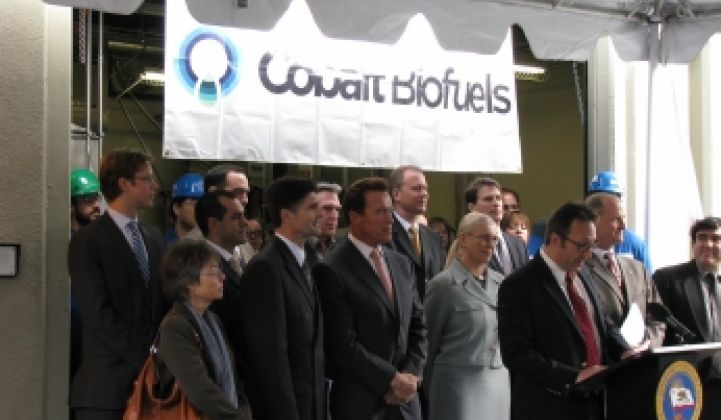Think of this as the Gerber of biofuels.
Cobalt Biofuels opened a demonstration plant today in Mountain View, California and says it will begin to commercially produce biobutanol-a liquid fuel that can be transformed into jet fuel, a green chemical for making polypropylene, or an additive for gas or diesel---in 2012.
But will it be economical? Yes, says CEO Rick Wilson. That 2012 plant will produce fuel for around $1.40 a gallon and crank out about a million gallons a year. That total doesn't include shipping and transportation costs but, if Cobalt makes its goals, the fuel will won't be an economic burden for fuel refiners.
More plants will follow in 2014. Governor Arnold Schwarzenegger, Carl Guardino from the Silicon Valley Leadership Group, and execs from Nanosolar, Bloom Energy and others were in attendance.
The Gerber angle comes from how the fuel gets produced. Cobalt uses a combination of chemical and biological processing. First, the company cooks wood chips and forest waste with chemical catalysts. In ordinary circumstances, the process can take days. Cobalt claims it can do this in ten to 15 minutes. That produces a sugary mash, sort of like baby food for bacteria. (Competitors Zeachem and Coskata also combine chemical and biological processes).
The mash is then inserted into a vat filled with bacteria, which ferment it into biobutanol in a relatively small container. The one in the pilot plant is about fifteen feet high and has a three foot circumference. (see video. There's some background noise but Wilson is a hoot.) The fermentation process is quite concentrated, which cuts down on the steel and equipment needed to turn sugar into fuel.
"In concentrating the bacteria, we've shrunk the fermentation ten times," he said. "In a (standard) ethanol plant, an equivalent amount of production would take a fermenter that has the circumference of the entire room.
Eventually, the company hopes to make reactors from other, less expensive materials like plastic. Feedstocks will be cheap too. Cobalt is even looking at using the trees killed by beetle infestation. Wood on the open market is around $60 a ton, he said. The U.S. could probably produce 7 to 8 billion gallons worth of fuel that can be produced in the U.S. by just harvesting waste wood.
"It's all about getting the cost down," he added. "The problem with biofuels is that they are expensive. Sooner or later, you've got to compete with petroleum. You can't deny that.
"The only thing you can count on is pure ruthless petroleum," he added.
Will they make it? Like with all biofuel companies, it remains to be seen. Biofuel demand in the U.S. should remain high for the next several years. Biofuel refiners are already behind in achieving the goals set out by the DOE. Still, building plants is not cheap, capital is tight, and gas prices have come down from their astronomical highs.



